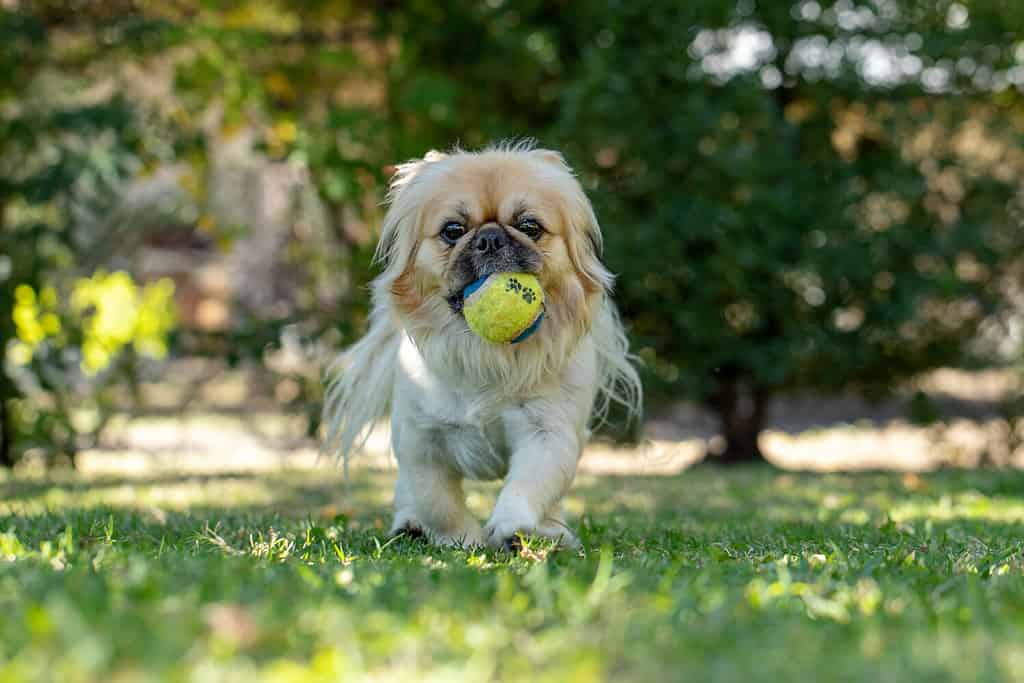The average Pekingese lifespan is between 12 to 14 years. This lifespan is about average for a smaller breed, as they tend to live longer than bigger dogs. Their primary cause of death is cardiovascular problems, like congestive heart failure.
Of course, taking proper care of your Pekingese is important if you want them to live their full lifespan. It’s important that they are fed a high-quality diet and taken to the vet regularly. Heart conditions can be diagnosed and treated early, which can help elongate your dog’s lifespan.
Dental issues are also very common in this breed. Their smaller mouth often causes teeth crowding, leading to decay and similar problems. Brushing is essential. If left untreated, dental problems can allow bacteria easy access to your dog’s body, potentially causing deeper issues. It may even shave a year or two off your dog’s lifespan.
How to Help Your Pekingese Live Longer

Pekingese are typically very good with other animals, including cats. This factor makes them pretty popular companion dogs.
©Ermolaev Alexander/Shutterstock.com
A dog’s lifespan partially depends on genetics and environmental factors. Therefore, it’s important that you take care of your dog properly. While you can’t change your dog’s genetics, you can change many important environmental factors.
One of the most important environmental factors is balanced nutrition. You should feed your canine a high-quality diet that’s suitable for their weight and age. Puppies should be fed puppy food suitable for small breeds, while adults should be given adult dog food.
You don’t have to switch older dogs to senior food, necessarily. Senior food is made to help dogs that are having age-related issues, not necessarily dogs of a certain age. Until your dog starts having joint problems or weight gain, you don’t need to feed them senior dog food.
Exercise is also vital. While the Pekingese don’t have a huge exercise need, they still need regular exercise to avoid weight gain and stay healthy. Daily walks and play sessions can help these canines exercise well.
As we talked about above, regular veterinary care is also important. If your dog ends up with any health problems, treating them early is vital. Most conditions are easier when treated early.
While not necessarily the biggest environmental factor, Pekingese also need a bit of grooming. If you don’t groom them properly, they can get matted and end up with sores. As you might imagine, sores can be hotbeds of infection. Therefore, you should brush your Pekingese almost daily or get them cut pretty short.
That said, you should avoid over-exercising these dogs or letting them hang out in hot weather. Their shortened snout can make breathing more challenging, leading to heat stroke and similar issues.
As always, be attentive to warnings of health issues. Any behavior, appetite, or physical appearance changes can signal an underlying issue.
Common Pekingese Health Issues

While these dogs need exercise, you should avoid overexercising them due to their shortened snout.
©AJ Laing/Shutterstock.com
Pekingese are prone to some health issues, which may be potentially deadly. Therefore, it’s important to understand these health problems so that you can spot them early.
These dogs are prone to breathing issues. They have brachycephalic airway syndrome, which means that their snout is too short for them to breathe properly. Many conditions can arise from this one, including an increased instance of lower respiratory and gastrointestinal problems.
Luckily, this condition can be managed by limiting exposure to heat, avoiding stress, and keeping exercise to a minimum. Be sure to maintain your Pekingese at an appropriate weight, as obesity can make this condition worse.
Pekingese are also prone to progressive retinal atrophy, which is a condition that causes the retina to break down. It is a genetic condition, meaning the dog is born with the disease. It isn’t curable, and the vast majority of dogs will go blind at some point. Luckily, this condition isn’t deadly, though.
Many Pekingese are also prone to dry eye, which occurs when the dog doesn’t produce enough tears. Tears provide lubrication to the dog’s eye, so a lack of tears can cause inflammation. The eye will also be sore and painful. The dog may have red eyes and may rub their eye.
In severe cases, ulcers can develop and require immediate treatment. In some situations, the dog may lose their eye without proper treatment.
The photo featured at the top of this post is © DejaVuDesigns/Shutterstock.com
Ready to discover the top 10 cutest dog breeds in the entire world?
How about the fastest dogs, the largest dogs and those that are -- quite frankly -- just the kindest dogs on the planet? Each day, AZ Animals sends out lists just like this to our thousands of email subscribers. And the best part? It's FREE. Join today by entering your email below.
Thank you for reading! Have some feedback for us? Contact the AZ Animals editorial team.






